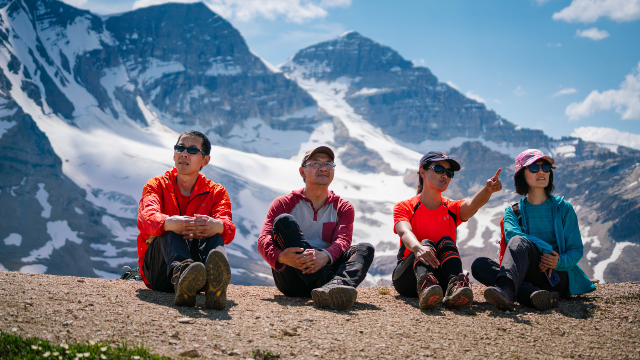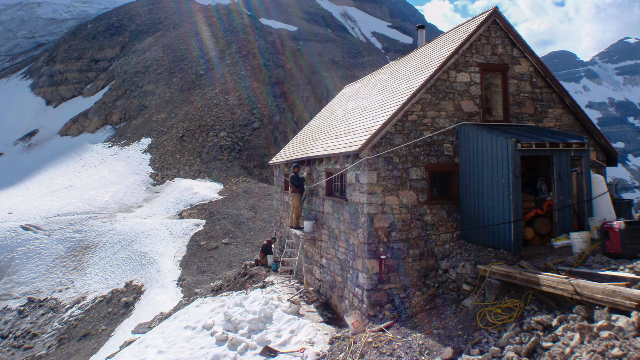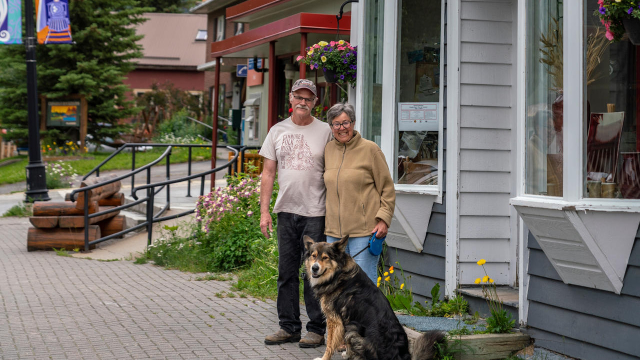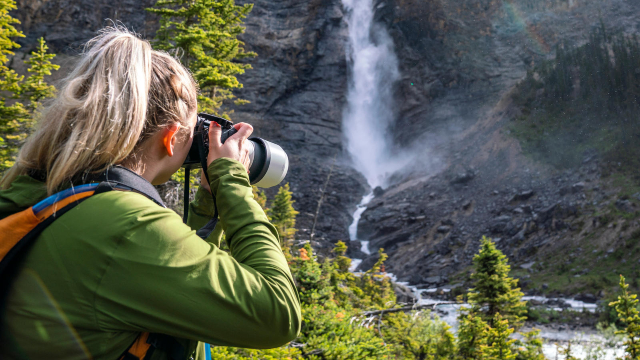
Stewardship and management
Yoho National Park
Guiding Documents
Yoho Park Management Plan 2022
A park management plan is a guide for future management of a national park. A management plan provides strategic direction by outlining a vision, key strategies, and measurable objectives with associated targets. Management plans are required by legislation every ten years. They are guided by public consultation, approved by the Minister responsible for Parks Canada, and tabled in Parliament. It is the primary public accountability document for each national park.
- Yoho Park Management Plan 2022
- What We Heard – A summary of public feedback
- Strategic Environmental Assessment – Available upon request. Please contact llyksuperintendent-directeurllyk@pc.gc.ca to obtain a copy.
Previous Park Management Plan:
- [archived file] Yoho Park Management Plan 2010 (PDF, 2 MB)
State of the Park Assessment 2018
"State of the Park” assessments communicate the overall condition of key aspects of the park. These assessments are undertaken every ten years to identify key management issues for the next park management plan.
Field Community Plan 2010
The current community plan for Field is based on a state of the community report, prepared in 2006, which assessed the ecological, cultural, economic, and social health of the community. It was undertaken in collaboration with the Field Community Council, the Canadian Pacific Railway, Field residents, and other interested stakeholders.
The 2022 Yoho Park Management Plan requires an update to the current Field Community Plan. We look forward to working closely with residents and stakeholders to update the plan.
National Historic Site Management Plans 2007
National historic sites commemorate the diversity of human experience and the legacy of thousands of years of human history. They mark the tangible cultural remains of the lives and stories of the people who forged Canada. The family of national historic sites is very large, encompassing more than 900 sites and representing every province and territory. Parks Canada administers more than 150 of these sites including fourteen sites in or near the mountain national parks.
Acts and regulations
Parks Canada’s legislation outlines its obligations and authorities with respect to the protected places under its responsibility. The Agency uses a wide range of tools to protect and present nationally significant examples of Canada’s natural and cultural heritage to connect Canadians to that heritage.
Park Management Plan Annual Reports
There are seven key strategies for the Yoho National Park Management Plan (2022), each with objectives and targets to help meet those strategies. We will share the highlights of achievements and progress in annual reports.
Public engagement
Field Community Plan Update
The current Field Community Plan was completed in 2010. Parks Canada is updating this plan to align with the 2022 Yoho Park Management Plan. The updated community plan will provide a framework for decision making in Field, B.C. Engagement will ensure that the updated Community Plan is informed by the knowledge, needs and aspirations of Field residents and stakeholders.
- Field Community Plan Update – Learn more about it and how to participate
Abbot Pass Refuge Cabin National Historic Site Remembrance
Abbot Pass Refuge Cabin (Abbot Pass Hut) was located at 2,926 metres on a mountain pass (col) near Lake Louise on the border of Banff and Yoho national parks. For 100 years, it was a destination and a refuge for hikers, climbers, mountaineers and others inspired by high and wild places. It was dismantled for safety in June 2022 after ongoing slope erosion compromised the hut’s structural safety and stabilization efforts were unsuccessful.
In spring 2023, Parks Canada launched a two-step public engagement process about how best to remember this national historic site and classified federal heritage building. This report outlines what Parks Canada heard during both phases of engagement.
Trans-Canada Highway Twinning Phase IVB
The first 6 kilometres of twinning of the Trans-Canada Highway at the east end of Yoho National Park, including wildlife crossing structures and fencing, was completed in 2018. Consultation with the public and Indigenous groups on substantial twinning design and a draft Detailed Impact Assessment (DIA) for the remaining 40 kilometres of highway through Yoho National Park is now complete.
Based on the DIA and consultation, Parks Canada has determined that this project may proceed when funding becomes available. There are currently no funds for construction.
Businesses and residents
Contact information
Business and municipal services for Yoho National Park including the community of Field, B.C. are provided by Parks Canada. To serve you faster, the most commonly requested information is offered below. Still have questions? We look forward to assisting you.
Office hours: Monday to Friday from 8 a.m. to 4 p.m. Mountain.
General inquiries: llyktownsites@pc.gc.ca 250-343-6117 (Field) 403-522-1186 (Lake Louise)
After-hours emergencies: Contact Park Dispatch at 403-762-1470
Business licenses
Any person providing goods or services in a national park, including guides , outfitters and non-profit organizations, must obtain a business license.
“Business” is defined as any trade, industry, employment, occupation, activity or special event carried on in a park or on Parks Canada-administered lands or waters outside of a park, for profit, gain, fund raising or commercial promotion, and includes an undertaking carried on in a park by a charitable organization, or by an organization or individual on a non-profit basis.
Information on the application process for Guided Businesses can be found below . For all other businesses, we ask that you contact your local Parks Canada office to obtain the applicable application form.
Please note that you may also be required to apply for a Basic Business License, depending on the nature of your business
- Does this apply to me? For the purposes of business licensing, “business” means any trade, industry, employment, occupation, activity or special event carried on in a park for profit, gain, fundraising or commercial promotion. This includes work carried out by charitable organizations or by an organization or individual on a non-profit basis.
- What are the timelines and fees? Business licences require on average 7-10 business days to process. Business licencing fees vary depending on the type and size of the business.
- Why are licenses required? Licenses allow us to regulate activities to ensure they are consistent with Parks Canada’s mission and mandate and what Canadians expect of national parks. They also ensure we can share important information with you about work that may impact your business.
- Who should I contact? Contact permiscommercialllyk-llykbusinesslicence@pc.gc.ca or 403-522-1186 for more information.
Guided Business Licenses
Anyone wishing to operate a guided /outfitter activity in a national park in Canada is required to apply to Parks Canada for a business licence. Please note that you may also be required to apply for a Basic Business Licence, depending on the nature of your business.
Guided business licences are generally issued for the following activities:
- hiking tours
- road biking tours
- backpacking tours
- interpretive walks
- guided mountaineering
- guided ski touring
- guided cross-country ski touring
- guided horseback tours
- rafting tours
- stand-up paddleboard
- outfitting
- all wilderness related tours and guided programs
Application process
The following procedure is for new guided/outfitter activity businesses seeking to operate in a national park. It is not applicable if you are seeking a replacement licence. A separate application form is available for this purpose. Please contact your local Parks Canada office for further information on this process.
All employees that will be conducting Guided Trips will be required to obtain a Guide Identification Card (see “Guide Identification Application Form Part IV ”), and carry this card at all times while guiding.
A separate application is available if you are seeking licensing as a new business in any other area other than guided/outfitter activities. We ask that you contact your local Parks Canada office to obtain the application form.
1. Application: How to apply for a license to conduct a guided or outfitter activity in a national park
- Complete the New Guided/Outfitter Activity Business Licence application form in full.
Note: Detailed information is necessary for Parks Canada to conduct an accurate evaluation of your application. If sufficient details are not provided, we will be unable to complete a review of your application. - Submit the completed application form, including all requirements in the documentation checklist .
Guided Business Liaison, Mountain Parks
Realty and Municipal Services
Jasper National Park of Canada
PO Box 10
Jasper, Alberta T0E 1E0
guidelicences-permispourguide@pc.gc.ca
2. Review: Parks Canada review process of a Guided/Outfitter Activity Business Licence application
- Receipt of Application: On receipt of your application, Parks Canada will review your submission for completion. Incomplete applications may be returned to you to provide further information or documentation.
- Summer applications must be submitted prior to September 1. (For the purpose of this application process, summer is defined as April 1 to October 31.)
- Winter applications must be submitted prior to March 1. (For the purpose of this application process, winter is defined as November 1 to March 31.
- Review/Evaluation: All applications will be evaluated and a recommendation for approval or denial will be forwarded to the Field Unit Superintendent, who makes the final decision based on this recommendation. Applicants will be contacted in the time frames indicated below. This review period recognizes the need for timely review in order to allow businesses to operate in the season following their application.
- Park personnel will review summer applications and will contact proponents by December 1.
- Park personnel will review winter applications and will contact applicants by June 1.
3. Decision: Field Unit Superintendent’s decision
- If the guided/outfitter activity business licence is approved: your business licence will be issued and become valid for the summer or winter season following approval. Any/all conditions imposed on the licence will be clearly defined and appended. The term of the licence cannot exceed one year and will expire on March 31 following the date of issuance.
If, at any time during the term of your licence, the parameters under which you are operating your business change, such as sale or transfer of the business, change in name or location, change to the nature of the business, or additions to the business, you must inform Parks Canada immediately. - If the guided/outfitter activity business licence is denied: you will be advised, in writing, of the reason(s) for the decision in as timely a manner as possible.
You will be notified of the decision in the manner that you have indicated in Part II of the “New Guided/Outfitter Activity Business Licence Application”.
4. Payment: If the application is approved, applicable fees for a Guided/Outfitter Activity Business Licence
While payment is not required until a determination is made on your application, payment for each activity will be payable prior to issuance of a guided/outfitter activity business licence.
Application form and other resources
Guided Business Licence Application Form for the Mountain National Parks (April 2023) (PDF, 1.11 MB)
Fillable pdf application form for new guided/outfitter activity businesses wanting to operate in a national park.
Other resources:
- Activity Table Template (PDF, 166 KB)
Fillable pdf of a blank activity table (appendix B). - Emergency Response Plan Guide (PDF, 367 KB)
Required information for Emergency Response Plan submission. - Blank Emergency Response Plan Template (Microsoft Word, 574 KB)
- Trails not requiring a Guided Business Licence (November 2023) (PDF, 105 KB)
A list of areas and trails in the Mountain National Parks where it is not required to have a Guided Business Licence. Notwithstanding, it is still required to have a Basic Business Licence to operate in the Mountain National Parks. - Areas, Trails and Activities with Restrictions (Document currently under review)
guidelicences-permispourguide@pc.gc.ca
780-820-0665
Leases and licenses of occupation
Any person who uses land for a business or residence in a national park requires a lease and/or license of occupation. National parks are owned by all Canadians and the land can be neither purchased nor sold.
- I have a lease and/or license of occupation. We welcome your questions about replacements, mortgage approvals, subleases and more. Please contact us at llyktownsites@pc.gc.ca
- I have never had a lease or license of occupation. Yoho National Park currently has a moratorium on new commercial leases, therefore no new commercial leases can be issued.
Development and building applications
All development and building projects in national parks require approval and may also require an impact assessment. Are you building or digging in a national park? Check with us first.
- Do I need development or building approval? Consult this Development FAQ for detailed information and please call the Development Office at 403-522-1266. We can help.
- What is the difference between development versus building approvals?
- Development applications allow for review of the project concept to ensure the development proposal meets the various Acts, Regulations, Policies and Guidelines that Parks Canada is obliged to uphold.
- Building applications allow review of a broad range of projects, unlike those issued in a typical municipal setting, and cover the technical requirements for a construction project to ensure it can be completed safely and with minimal impact to the environment, adjacent leaseholders and the visiting public
- Why is an impact assessment also required? Parks Canada is mandated to protect natural and cultural resources in national parks. Impact assessments identify concerns and measures to mitigate adverse effects on these resources. Most development and construction projects in national parks impact people or the environment and are required by law to undergo an impact assessment.
- Who approves my development and building application? Superintendents are responsible for approving development and building applications.
- What are the timelines and fees? Timelines and fees vary depending on the complexity of the project and the estimated cost of construction. Consult this Development FAQ or contact us directly.
- Who should I contact?We welcome your questions. Contact llyktownsites@pc.gc.ca
Townsite management
Parks Canada provides municipal services to the Village of Field. The Field Advisory Board (FAB) works closely with us to provide advice and communicate with residents.
- Water, sewer and solid waste services
- Parks Canada manages the Field Wastewater Treatment Plant and coordinates solid waste services for Yoho National Park.
- For after-hours emergencies, contact Banff Dispatch at 403-762-1470.
- For all other inquiries call the Field Townsite Liaison Officer at 403-522-1186.
- Electricity and heating services
- Electricity is provided by BC Hydro. Please call 1 800 BCHYDRO (1 800 224 9376) if you experience any problems.
- Road maintenance and snow removal
- For this small community, Parks Canada provides relatively frequent snow removal. The safety of the Trans-Canada Highway takes priority and plows service the village Field as soon as possible. We get epic snow! Please be prepared.
Fees and Taxes
Residents partially cover the cost of providing water, wastewater and garbage services by paying fees-for-service.
Parks Canada covers the cost of providing additional services from general national park operating funds. These additional services include wildland fire protection and risk reduction, avalanche control, wildlife management, snow removal and maintenance. Parks Canada cannot levy taxes and does not receive federal transfer payments to provide municipal services in national parks.
The Province of B.C. and the Columbia Shuswap Regional District collect taxes from Yoho National Park residents for the provision of other regional and municipal services. Parks Canada also pays for these services by making annual Payments In Lieu of Taxes (PILT) . This is the mechanism by which federal properties in Canada, although exempt from taxation, share costs equitably with neighbouring jurisdictions.
Staff housing
If you are a Parks Canada employee seeking information about staff housing, please reach out to your supervisor. For existing tenants, please contact our Housing Officer at 403-763-0736 or llyklogements-llykhousing@pc.gc.ca
Eligible residency
What is Eligible Residency?
Residential leases in Field restrict occupancy to eligible residents as defined in national park regulations. The eligible residency provisions ensure that community residential lands are available exclusively for community use, rather than recreational or second home purposes.
Why have Eligible Residency?
To ensure that a broad supply of housing types are available for those who work and raise families in the community, all people living in national park communities must meet eligible residency requirements. This ensures that housing remains available for those whose primary objective is to live and work in the community.
Who is an Eligible Resident?
According to the National Parks Lease and License of Occupation Regulations an eligible resident is defined as:
(a) an individual whose primary employment is in the park,
(b) an individual who operates a business in the park and whose presence at the place of business is necessary for the day-to-day operation of the business,
(c) a retired individual who resides in the park and who, for five consecutive years immediately prior to retirement,
(i) was employed primarily in that park, or
(ii) operated a business in that park and whose presence at the place of business was necessary for the day-to-day operation of the business,
(d) a retired individual who resided in the park at the time of the individual's retirement and who resided in that park on July 30, 1981,
(e) an individual who is a student in full-time attendance at an educational institution that is located within the park and registered under the Income Tax Act or applicable provincial legislation relating to education,
(f) an individual who is a lessee of public lands in the park and who
(i) was the lessee of those public lands prior to May 19, 1911, or
(ii) is a descendant, by blood or adoption, of an individual who was the lessee of those public lands prior to May 19, 1911, or
(g) the spouse or common-law partner or a dependant of an individual referred to in any of paragraphs (a) to (f).
(2) For the purposes of these Regulations, an individual who resides in, operates a business in or whose primary employment is in Lake Louise, and who is an eligible resident of Banff National Park of Canada under paragraph (a) or (b) of the definition eligible resident in subsection (1), is an eligible resident of both Yoho National Park of Canada and Banff National Park of Canada.
Some facts about eligible residency
- You do not need to be an eligible resident to lease property in Field. However, you do need to be an eligible resident to reside here.
- Operation of either a Home Occupation business or a Bed & Breakfast Home does not satisfy the requirements of eligible residency.
Enforcement
- Eligible residency will be enforced by Parks Canada to ensure that those living in the community have an established need to reside here. Ultimately, lessee non-compliance with lease terms can result in lease cancellation.
It is a criminal offense to make a false statutory declaration of eligible residency.
Disclaimer
This document has no legal status and cannot be used as an official interpretation of the various codes and regulations currently in effect. It is meant solely to provide information that may be of general assistance to interested parties.
Yoho National Park, Townsites and Realty Office
Phone: 403.522.1186
Email: llyklotissementsurbains-llyktownsites@pc.gc.ca
Filmmakers and photographers
To film or photograph in the national parks, an application must be submitted to Parks Canada twenty days prior to activities. If approved, a permit will be issued which outlines conditions and supplementary requirements associated with the production. This information will help you prepare an application.
Special events
All special events including festivals, weddings and conferences require a special event permit.
Contact us at llyktownsites@pc.gc.ca
On behalf of the people of Canada, we protect and present nationally significant examples of Canada's natural and cultural heritage and foster public understanding, appreciation and enjoyment in ways that ensure their ecological and commemorative integrity for present and future generations.
- Date modified :



